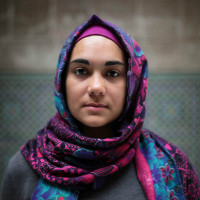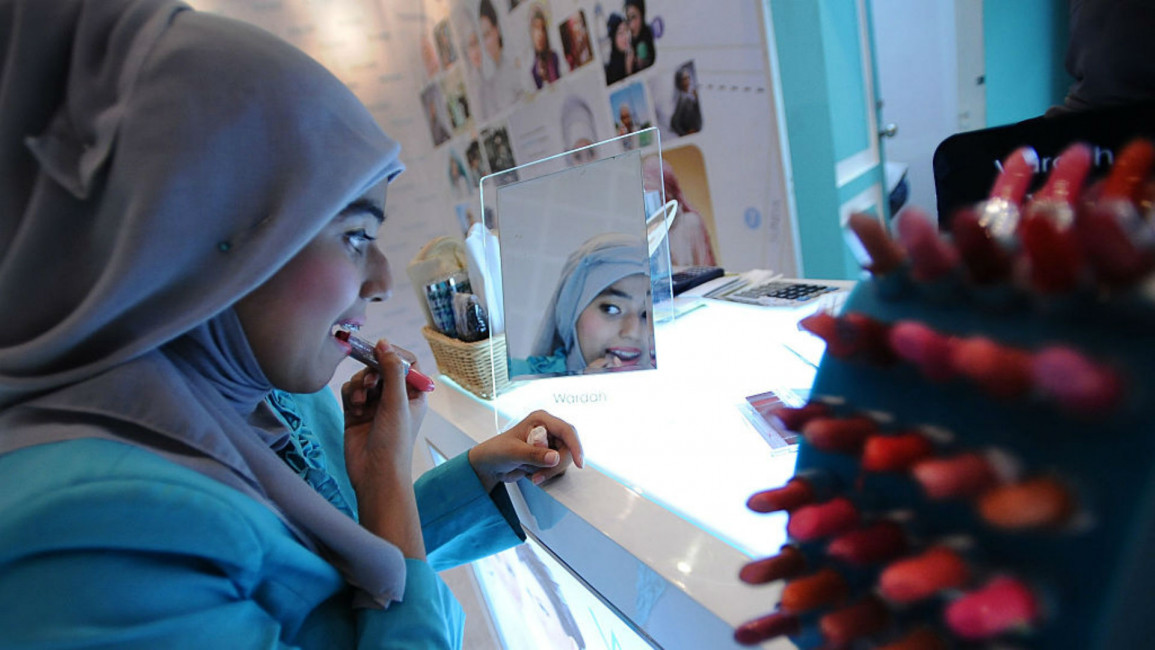
I don't need your suhoor makeover, MAC
Suhoor is the pre-dawn meal that fasting Muslims eat before the morning prayer and beginning the day's fast.
This month, Muslims around the world are fasting up to 22 hours per day, and, unsurprisingly, MAC's proposed makeup look has attracted the ire of fasting Muslims.
In recent years, the fashion and beauty industries have begun to recognise the spending power of Muslims and released collections and advertisements that aim to tap into that market and get us to part with our hard-earned pennies.
But it's hard to get excited about inclusion when it is backhanded and cringeworthy.
I don't know about you, but my suhoor time is precious.
My game-plan is less about getting my shimmer eyes perfect in time for dawn prayer, and more an Olympic sport in shovelling desserts against the clock.
But the creative powers at MAC seem oblivious to the fact that most Muslims are lucky if they make it to suhoor in anything more presentable than unwashed jogging bottoms and drool-free nighties. Forget about formalwear and a full face of makeup.
This Ramadan, clothing retailer H&M released a modest collection for Ramadan that included transparent clothing, knee-length hemlines and traditional clothing. In short, it released a series of items that a shopper can already buy on the high street or at their local market, for half the price.
 |
It's hard to get excited about inclusion when it is backhanded and cringeworthy |  |
It offered nothing new, and missed the mark by ignoring the demand for high-street clothing that doesn't need to be layered with long sleeves and high necklines.
Like H&M, MAC's advert betrays their lack of understanding of Muslim demand. The beauty tutorial assumes that Muslims cannot face their avocado toast or bowl of cornflakes without the perfectly contoured cheeks.
Muslims who wake up for suhoor - currently at around three to four in the morning - do so to fuel themselves for the day and to fulfil their morning prayer obligation, not to labour over applying the MAC tutorial's teddy eye kohl, which they'll have to wipe off in order to ablute anyway.
| Instagram Post |
The only teddy eyes I want to see at 4am are the ones I cuddle peacefully back to slumber.
MAC's release is toe-curlingly misogynistic too, telling Muslim women, as if we needed telling again, how to appear.
It's not enough for us to fast 15 hours a day while going to work or running around after children or, in my case, spending thirteen hours stalking trifles and lemon drizzle cakes on Instagram like it's my very own dessert Tinder. No, in MAC's view, we have to have eyelids as golden as the desert dunes in order to be worthy of a suhoor meal.
Why is it always women who face a flurry of tutorials? Don't Muslim men need to look presentable at the crack of dawn? Where is the glitter beard tutorial that will help them to better eat that suhoor shish kebab?
The lash-lifting kohl that makes the biryani even more appetising? The tummy contouring to help them hide their feast-fuelled bulges? I want to see that man gaze wistfully off camera while MAC tells him how he should look for Ramadan.
Blend your eyeshadow, they tell us. Somebody inform MAC that the only blending I'll be doing at suhoor is for that perfect banana-strawberry smoothie.
Lastly, in this tutorial - which doesn't even fulfil the basic requirements of a tutorial, since the model was already heavily made up before the instruction began, we're told to apply some Haute and Naughty mascara which is frankly embarrassingly named for a Ramadan-themed look.
What next? Will MAC follow this video with a Wudu tutorial, styling us with the perfect highlighter with which to greet the ablution stalls?
Will I soon be instructed on how to shape my toenails for that ideal night prayer look? Get your feet taraweeh ready with MAC.
Critics of MAC's suhoor look wonder if the company intended the tutorial to be used for iftar - the meal with which Muslims break their fast - rather than suhoor, which would be just as an embarrassing a gaffe as telling women to dress up for a midnight binge.
 |
Don't Muslim men need to look presentable at the crack of dawn? |  |
While it is true that a minority of Muslims in the Arab world and Asia meet for suhoor in the early morning, this accounts for a tiny and elite minority who don't have work to get to four hours later. And rather than being a separate outing, these suhoors are more of an extension of a long feast that begins at sundown.
Muslim spending power rests with the masses, rather than the extremely affluent minority, particularly for a high-street brand like MAC. At best, this advert reinforces classism, catering only to an elite minority and, at worst, exposes its complete lack of understanding of Muslims and Ramadan, rebranding the holiest month in the Muslim calendar as nothing more than an opportunity to dress up.
We don't need a Ramadan makeup tutorial.
Twitter Post
|
There is nothing about Ramadan that needs to be shoehorned into a beauty look. Those of us who wear makeup can do so without a condescending video that reduces worship to looking 'glamorous'.
And if MAC truly needed to mark Ramadan, I would have much preferred a daytime-look tutorial that instructs me on how to hide my midnight feast-induced panda eyes.
I need waterproof mascara to help with the tears of hunger I spill every time I see a molten chocolate lava cake. I need a lip tint that doesn't transfer over to the queue of sugared doughnuts and caramel eclairs that await my lips on the adhan's call.
Thanks but no thanks, MAC. I'll stick to my unwashed jogging bottoms, drool-stained nightie and panda eyes.
Ruqaya Izzidien is a British-Iraqi freelance writer specialising in social and cultural affairs. Her work has been published in The New York Times, the Guardian, the BBC and Al Jazeera English, and her upcoming novel is entitled The Watermelon Boys.
Follow her on Twitter: @RuqayaIzzidien
Opinions expressed in this article remain those of the author, and do not necessarily represent those of The New Arab, its editorial board or staff.




